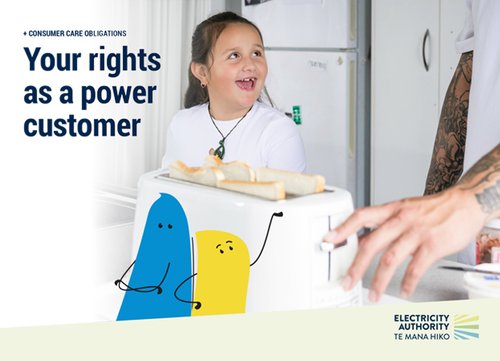Consumer Care Obligations
Knowing your rights means you can get the support and service you deserve.


Your rights
Power is an essential part of daily life
As a power customer, you have the right to receive fair, consistent, and supportive service from your power company. Take time to understand your rights. Knowing your rights helps you get the support you need. It also ensures you’re treated respectfully and fairly.
Your rights as a power customer
The Consumer Care Obligations are rules that all power companies must follow to help you stay connected and manage your power bills. Some of the most important rules are to help prevent you from being disconnected.
Your power company must:
- treat you with respect and communicate clearly
- have a clear, easy-to-find consumer care policy
- work with you to keep your electricity supply connected and affordable (this may include offering advice on energy use, suitable pricing plans, or payment options)
- ensure fees are reasonable and reflect actual costs (like reconnection fees)
- be clear about discounts and bonds (a bond is an upfront lump sum payment to a retailer)
- ask if you or someone in your household relies on electricity to prevent serious harm to health, and if so, help you get registered as a medically dependent consumer
- not disconnect you, if you or someone in your household is a medically dependent consumer
- provide you with support if you’re having trouble paying your bill.
Your power company must have a consumer care policy that explains how they will meet these obligations, and publish it on their website in a place that is easy for you to find.
Download our handy guide

Talk to your power company
Get in touch with your power company if you:
- have a query or issue
- want to make a complaint
- need advice or information.
You will find your power company's contact details on their website and on your electricity bill. If you aren't sure who your power company is, find out by searching on Your meter.
You can choose a support person and alternative contact person if needed. If you choose to have an alternative contact person, confirm with your power company they have your permission to act for you.
Here's what you should know if...

You're signing up to a new power company
When you sign up to a new power company, you should know what protections are in place for you.

You're finding it hard to pay your bill
It can be hard to pay your bills from time to time. Here are some things you can do if you are finding it hard to pay your bill.

You rely on electricity for medical reasons
If you or someone at home relies on electricity for medical reasons, let your power company know so they can help you register as medically dependent consumer.

Your power company doesn't meet their obligations
Your power company must comply with the Consumer Care Obligations and their own consumer care policy. Know what to do if they don't.